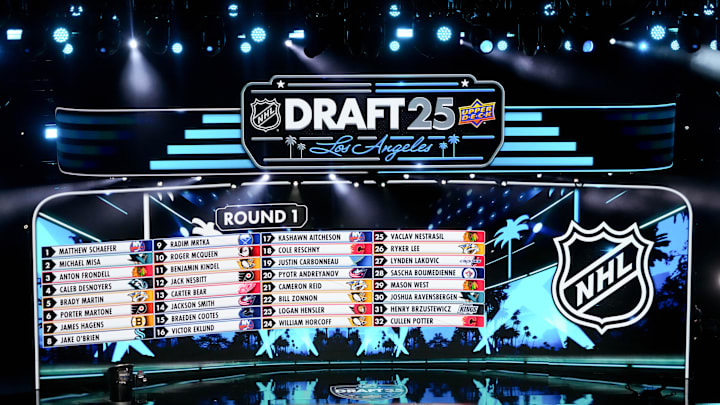This past year's NHL Entry Draft was interesting, to say the least. The owners tried a decentralized format this year. The draft took place at the Peacock Theatre in Los Angeles, instead of Crypto.com Arena, with Gary Bettman and the draftees in attendance.
The significant difference was that the general managers weren't present in person. Each GM stayed in their cities or draft base to make selections and conduct trades.
The reason was an attempt to expedite the draft and avoid having all 32 teams on the covered ice, which would cause chaos with pick selections. Unfortunately, that is not how the 1st round ended up. The 1st round took almost 5 hours to complete all 32 picks with some trades involved.
Gary Bettman as well as the ESPN+ and NHL Network crews all had to adjust to the new format. The NHL utilized over 100 cameras to implement a high-tech approach. The draft came off to fans as slow, clunky, and awkward. Gary Bettman had to stall for time sometimes and even dished out some dad jokes.
For the fans, it was a slog and painful first decentralized draft to watch, and for members of the media, it was worse to cover. For the GMs, they welcomed this new format with open arms. They were in their comfort zone -- teams didn't have to send representatives to LA, managers didn't need to make calls in a loud arena, nor try to make texts on a heavily taxed arena Wi-Fi.
The event still had its share of usual draft moments, including the draft picks wearing the team's jerseys and emotional interviews. That is why, according to multiple reports, the GMs are in favor of maintaining the decentralized format. And why won't they change it, given the reasons above? Why wouldn't they want to stay in their offices and conduct draft business?
It's cheaper for teams to keep personnel in one location, rather than having to fly them out. Now, some issues can be addressed, for example, by reducing the pick time and having drafted players be ready to interview right away.
Fan interactions could be introduced more, with real-time questions, turning the broadcast into a hybrid Twitch stream! Okay, I'm getting a bit carried away with this, but most fans agree that there are a lot of bugs to work out with this new decentralized format. The GMs love it, and that's a good enough reason to keep it around. If it's going to stay, might as well make the best of it.
